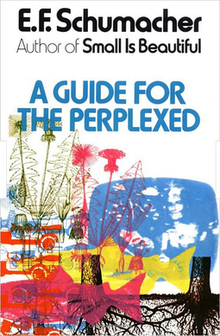A Guide for the Perplexed

Cover from 1978 paperback edition
|
|
| Author | E. F. Schumacher |
|---|---|
| Genre | Non-fiction |
| Published | 1977 (Harper Perennial) |
| Pages | 160 pages |
| ISBN | |
A Guide for the Perplexed is a short book by E. F. Schumacher, published in 1977. The title is a reference to Maimonides's The Guide for the Perplexed. Schumacher himself considered A Guide for the Perplexed to be his most important achievement, although he was better known for his 1973 environmental economics bestseller Small Is Beautiful, which made him a leading figure within the ecology movement. His daughter wrote that her father handed her the book on his deathbed, five days before he died and he told her "this is what my life has been leading to". As the Chicago Tribune wrote, "A Guide for the Perplexed is really a statement of the philosophical underpinnings that inform Small is Beautiful".
Schumacher describes his book as being concerned with how humans live in the world. It is also a treatise on the nature and organisation of knowledge and is something of an attack on what Schumacher calls "materialistic scientism". Schumacher argues that the current philosophical 'maps' that dominate western thought and science are both overly narrow and based on some false premises. However, this book is only in small part a critique.
Schumacher put forward what he considers to be the four great truths of philosophical map making:
Schumacher was very much in favor of the scientific spirit, but felt that the dominant methodology within science, which he called materialistic scientism, was flawed and stood in the way of achieving knowledge in any other arena than inanimate nature. Schumacher believed that this flaw originated in the writings of Descartes and Francis Bacon, when modern science was first established.
He makes a distinction between the descriptive and instructional sciences. According to Schumacher the descriptive sciences are primarily concerned with what can be seen or otherwise experienced, e.g. botany and sociology, while the instructional sciences are concerned with how certain systems work and can be manipulated to produce certain results, e.g. biology and chemistry. Instructional science is primarily based on evidence gained from experimentation.
...
Wikipedia
